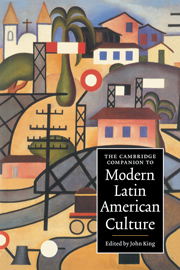Book contents
- Frontmatter
- Introduction
- 1 Pre-Columbian and colonial Latin America
- 2 Latin America since independence
- 3 Spanish American narrative, 1810-1920
- 4 Spanish American narrative, 1920-1970
- 5 Spanish American narrative since 1970
- 6 Brazilian narrative
- 7 Latin American poetry
- 8 Popular culture in Latin America
- 9 Art and architecture in Latin America
- 10 Tradition and transformation in Latin American music
- 11 The theatre space in Latin America
- 12 Cinema in Latin America
- 13 Hispanic USA
- Index
7 - Latin American poetry
Published online by Cambridge University Press: 28 May 2006
- Frontmatter
- Introduction
- 1 Pre-Columbian and colonial Latin America
- 2 Latin America since independence
- 3 Spanish American narrative, 1810-1920
- 4 Spanish American narrative, 1920-1970
- 5 Spanish American narrative since 1970
- 6 Brazilian narrative
- 7 Latin American poetry
- 8 Popular culture in Latin America
- 9 Art and architecture in Latin America
- 10 Tradition and transformation in Latin American music
- 11 The theatre space in Latin America
- 12 Cinema in Latin America
- 13 Hispanic USA
- Index
Summary
To find a ground for poetry which is not an inheritance from the past, however prestigious, nor a programme for social change, however necessary, has been a recurrent preoccupation for Latin American poets. Pablo Neruda's long poem 'Alturas de Macchu Picchu' ('Heights of Macchu Picchu') is one of the key poems where those concerns are worked out: 'Alturas' is itself part of Canto general (1950; Canto general), an epic presentation of the land, prehistory, history and politics of Latin America up until the middle of the twentieth century. Canto general celebrates Latin America as an alternative to already-known histories, a new world and a new definition of the possible. But in 'Alturas', that epic narrative reaches a point of collapse: the magnificence of the native Inca city, whose architecture makes it seem to grow out of the extraordinary subtropical landscape, is not enough. A terrible grief for the nameless, forgotten dead and the hunger and slavery they suffered floods into the poem and extends outwards into a wider need to mourn the unburied and unmourned of later history, from the Spanish Conquest to the dictatorships of the twentieth century. And with that the language itself breaks, and reveals its architecture of unresolved pain and violence, the long burden of conquest, colonialism, hunger and early death secreted in the language spoken by Latin Americans through into the twentieth century and beyond.
- Type
- Chapter
- Information
- The Cambridge Companion to Modern Latin American Culture , pp. 136 - 170Publisher: Cambridge University PressPrint publication year: 2004
- 2
- Cited by

